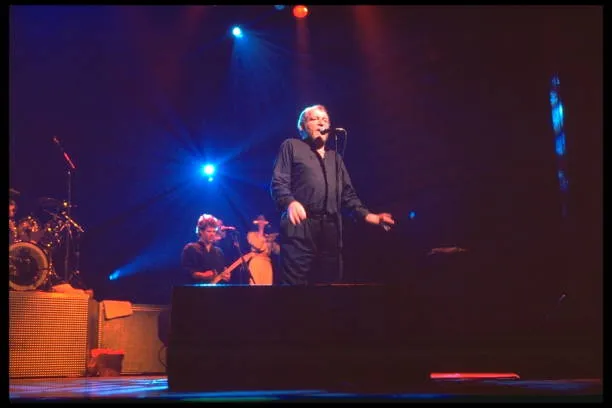It was supposed to be a brilliant comeback and ended in disaster: In 1974, Joe Cocker presented his new album "I Can Stand A Little Rain" to a small audience. In the end he just staggered drunk across the stage. Rüdiger Bloemeke was there - and took the only pictures of the crash of the legend.
It was supposed to be a terrific comeback: Joe Cocker live at the Roxy Theater on the Sunset Strip. A comeback from the drug swamp - with a new LP in their luggage. Because the Woodstock star had made a name for himself in the years before, mainly through excesses. His last success was four years ago: in 1970 the live double album of his US tour "Mad Dogs & Englishmen" became a world hit.

"Live at the Roxy": Diese Ankündigung war in den siebziger Jahren eine Auszeichnung für jeden Pop-Künstler. Der Club in West Hollywood, der ursprünglich Lou Adler, David Geffen und Compagnons gehörte, wurde 1973 von Neil Young eröffnet. Ein Jahr später kam Joe Cocker - mit Bierflasche in der Hand.
At the end of the tour, however, Cocker was a wreck: the former plumber from Sheffield, England, who had catapulted himself onto the world stage with these performances, could not withstand the stress. Years of frustration, failure, failures due to drugs and alcohol, and falling into insignificance followed. Now, in 1974, he had finally gone back into the studio in Los Angeles for his record company A&M. He had collected half a million dollars for the new contract - and immediately spent it to buy his way out of his manager.
Gag contract for the hero of Woodstock
There would be no exit from show business for Cocker, that was clear. He was contracted to produce more albums and as long as they sold, he would not be released from the contract. And so, that evening in May 1974, he was not only on stage at the Roxy to present his new record, but also to fulfill a deal that he had been rumored to have regretted for a long time.Invited to this " Special Performance" were people from the music industry and the press. My wife and I, visiting Los Angeles, were welcome as European journalists. According to A&M spokesman Bob Garcia, who is now in charge of the performance at the Roxy Theater, Joe Cocker himself insisted on performing the tracks from his new album "I Can Stand A Little Rain" in front of a small, handpicked audience.

"I Can Stand A Little Rain": Zur Live-Präsentation seines neuen Albums hatte Joe Cocker ins legendäre "Roxy" geladen. Der Auftritt geriet zum Desaster.
The Roxy, about the size of Onkel Pö's Carnegie Hall in Hamburg, was two-thirds full shortly before 10 p.m. Joni Mitchell was sitting at one of the small tables with a male companion. Apparently no photographers showed up, we were the only ones with a camera. After his many failures, the expectations of the singer were not very high. For the record, however, producer Jim Price hired top-notch musicians: Jim Horn and Nicky Hopkins, the cream of session musicians of the time, singer-songwriters Jimmy Webb and Randy Newman, and Toto's Jeff Porcaro, to name just a few.
Appearance with beer bottle
22 O `clock. The band got going right away. "Ladies and Gentlemen: Joe Cocker!" The star of the evening appeared with a beer bottle in his hand - as if he were a guest in an English pub. That's how the gigs in his native Sheffield had always started when he was still frontman of the band Vance Arnold And The Avengers, when he was still lean and wiry.

Zurück: Seit seinem legendären Auftritt in Woodstock hatte Joe Cocker ein paar Pfund zugelegt - offensichtlich vor allem mithilfe übermäßigen Alkoholkonsums.
He looked plump now, with fat on his hips. The white T-shirt stretched over his stomach, he flailed his bare arms, his curls hung over his forehead. The musicians set a tempo that he could hardly keep up with. But: "Why should I worry when I know, you're loving me" he sang - that almost sounded like an apology. The applause was still certain, even if he had thrown the number crystal clear in the sand. In general, the new lyrics that evening got a deeper meaning: "I made it before and I can make it some more" was the chorus of the album titled "I Can Stand A Little Rain," which the chorus insistently repeated. The star of the evening remembered his leading role and introduced the musicians. But what he slurred into the microphone was barely understandable, the names were lost in the murmur.

Allein auf der Bühne: Der "weiße Sänger mit der schwärzesten Stimme", als der er zuvor gefeiert wurde, war bei der Präsentation seines neuen Albums 1974 nur noch ein Schatten seiner selbst. Er vergaß Texte, wankte um das Mikrofon herum, hörte irgendwann sogar ganz auf, zu singen.
Only polite applause instead of thunderous applause
He'd done it before, why not here in Hollywood now? Five years ago - almost 3,000 miles away on the east coast - the hippies of Woodstock had chosen him as a world star when he played the air guitar, gesticulating wildly. The man from the English steel city was celebrated as the blackest white voice at the time. Now all he got was polite applause.
Joe Cocker took refuge in a ballad, "You Are So Beautiful," his last big hit of the 1970s, the song that decades later would become an evergreen. The piece caused him audible problems. There was unrest in the audience. Instead of listening, the guests talked. Cocker caught himself, but by the next song he was roaring like a Cocker parody.

Unsicherer Cocker: Statt wie bei seinem Auftritt in Woodstock virtuos Luftgitarre zu spielen, ruderte Joe Cocker 1974 im Roxy nur noch wild und hilflos mit den Armen.
Related articles
The band played the world famous opening bars of "With A Little Help From My Friends". It was his first big hit, it could have been his salvation. But Cocker wanted no more, interrupted the band. With the Jimmy Webb piece "It's A Sin When You Love Somebody" he didn't know what to do with the text and left the singing to the choir girls.
Awkward silence, broken cocker
Jimmy Webb sat down at the piano and intoned his composition "The Moon Is A Harsh Mistress". The audience went silent. At the end there was thunderous applause - for the pianist. Joe Cocker swayed around the microphone, pulling at his sweaty hair, slowly slid down the microphone to where his bottle was on the floor.

Haltlos: Das Mikrofon bot keinen Halt mehr, der Künstler stürzte ab.
"Hey Joe!" came the shouts from the auditorium. He looked around with glazed eyes, trying to spot familiar faces in the audience. The A&M announcer translated, "Joe wants to know if there's anyone he knows here!" No Answer. He hadn't even managed to perform all ten tracks on the LP. The botched cues had irked the band, who were now playing solo after solo. After a short vote, she left the stage.
On the darkened stage, the man from Sheffield remained squatting on the floor, and we viewers stayed too, so as not to leave him alone. "Come sing the blues with me," he asked. Silence, awkward silence. Nothing happens, he shrugged his shoulders and summed it up: "No piano player!" Another slurred attempt to improvise, and then he too staggered away.

Cocker am Boden: Die Band hatte verärgert über Cockers Performance die Bühne verlassen. Er blieb allein zurück - mit seiner Bierflasche.
The next morning I called A&M to see what the record company would say about the PR disaster. Spokesman Garcia didn't embellish anything, it was completely clear to him: his star had ruined himself by drinking - he was silent about drugs. Indeed, throughout the 1970s, Cocker was more attached to the bottle and the needle than he was to the stage. He actually recorded records, as was asked of him. Eight years passed before the real Cocker comeback. It's a symbolic title again: "Up Where We Belong". The film song from "An Officer and a Gentleman", sung together with Jennifer Warnes, won an Oscar in Hollywood in 1983.
One of the most impressive songs Joe Cocker sang on the record featured at the Roxy is "Guilty," a drunk ballad. On Cocker's website today, alongside "You Are So Beautiful" and "The Moon Is A Harsh Mistress", it is highlighted as a "Cocker classic" - with the addition "from his darkest days".



